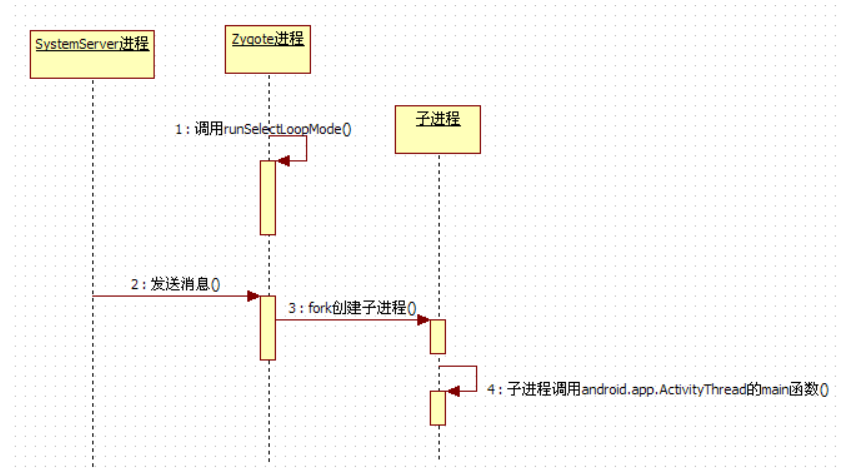ZygoteSource
原理图
sequenceDiagram
ZygoteProcess->>ZygoteProcess: ZygoteInit.main
activate ZygoteProcess
ZygoteProcess->>SystemServerProcess: forkSystemServer
activate SystemServerProcess
SystemServerProcess->>SystemServerProcess: handleSystemServerProcess
activate SystemServerProcess
SystemServerProcess->>SystemServerProcess: ZygoteInit.zygoteInit
deactivate SystemServerProcess
activate SystemServerProcess
SystemServerProcess->>SystemServerProcess: SystemServer.main
deactivate SystemServerProcess
deactivate SystemServerProcess
activate ZygoteProcess
ZygoteProcess->>ZygoteProcess: runSelectLoop
SystemServerProcess->>ZygoteProcess: notify
activate ZygoteProcess
ZygoteProcess->>ZygoteProcess: processOneCommand
ZygoteProcess->>ChildAppProcess: Zygote.forkAndSpecialize
deactivate ZygoteProcess
activate ChildAppProcess
ChildAppProcess->>ChildAppProcess: handleChildProc
activate ChildAppProcess
ChildAppProcess->>ChildAppProcess: ZygoteInit.zygoteInit
deactivate ChildAppProcess
activate ChildAppProcess
ChildAppProcess->>ChildAppProcess: ActivityThead.main
deactivate ChildAppProcess
deactivate ChildAppProcess
deactivate ZygoteProcess
deactivate ZygoteProcess

ZygoteInit.main
public static void main(String argv[]) {
ZygoteServer zygoteServer = new ZygoteServer();
for (int i = 1; i < argv.length; i++) {
if ("start-system-server".equals(argv[i])) {
startSystemServer = true;
} else if ("--enable-lazy-preload".equals(argv[i])) {
enableLazyPreload = true;
} else if (argv[i].startsWith(ABI_LIST_ARG)) {
abiList = argv[i].substring(ABI_LIST_ARG.length());
} else if (argv[i].startsWith(SOCKET_NAME_ARG)) {
socketName = argv[i].substring(SOCKET_NAME_ARG.length());
} else {
throw new RuntimeException("Unknown command line argument: " + argv[i]);
}
}
zygoteServer.registerServerSocketFromEnv(socketName);
if (startSystemServer) {
Runnable r = forkSystemServer(abiList, socketName, zygoteServer);
// {@code r == null} in the parent (zygote) process, and {@code r != null} in the
// child (system_server) process.
if (r != null) {
r.run();
return;
}
}
Log.i(TAG, "Accepting command socket connections");
// The select loop returns early in the child process after a fork and
// loops forever in the zygote.
caller = zygoteServer.runSelectLoop(abiList);
// We're in the child process and have exited the select loop. Proceed to execute the
// command.
if (caller != null) {
caller.run();
}
}
forkSystemServer
private static Runnable forkSystemServer(String abiList, String socketName,
ZygoteServer zygoteServer) {
/* Request to fork the system server process */
pid = Zygote.forkSystemServer(
parsedArgs.uid, parsedArgs.gid,
parsedArgs.gids,
parsedArgs.runtimeFlags,
null,
parsedArgs.permittedCapabilities,
parsedArgs.effectiveCapabilities);
/* For child process */
if (pid == 0) {
if (hasSecondZygote(abiList)) {
waitForSecondaryZygote(socketName);
}
zygoteServer.closeServerSocket();
return handleSystemServerProcess(parsedArgs);
}
/** @return 0 if this is the child, pid of the child
* if this is the parent, or -1 on error.
*/
public static int forkSystemServer(int uid, int gid, int[] gids, int runtimeFlags,
int[][] rlimits, long permittedCapabilities, long effectiveCapabilities) {
int pid = nativeForkSystemServer(
uid, gid, gids, runtimeFlags, rlimits, permittedCapabilities, effectiveCapabilities);
// Enable tracing as soon as we enter the system_server.
if (pid == 0) {
Trace.setTracingEnabled(true, runtimeFlags);
}
return pid;
}
SystemServer
handleSystemServerProcess
/**
* Finish remaining work for the newly forked system server process.
*/
private static Runnable handleSystemServerProcess(ZygoteConnection.Arguments parsedArgs) {
ClassLoader cl = null;
if (systemServerClasspath != null) {
cl = createPathClassLoader(systemServerClasspath, parsedArgs.targetSdkVersion);
Thread.currentThread().setContextClassLoader(cl);
}
/*
* Pass the remaining arguments to SystemServer.
*/
return ZygoteInit.zygoteInit(parsedArgs.targetSdkVersion, parsedArgs.remainingArgs, cl);
}
zygoteInit
public static final Runnable zygoteInit(int targetSdkVersion, String[] argv, ClassLoader classLoader) {
Slog.d(RuntimeInit.TAG, "RuntimeInit: Starting application from zygote");
RuntimeInit.commonInit();
ZygoteInit.nativeZygoteInit();
return RuntimeInit.applicationInit(targetSdkVersion, argv, classLoader);
}
RuntimeInit.commonInit
@UnsupportedAppUsage
protected static final void commonInit() {
/*
* set handlers; these apply to all threads in the VM. Apps can replace
* the default handler, but not the pre handler.
*/
LoggingHandler loggingHandler = new LoggingHandler();
RuntimeHooks.setUncaughtExceptionPreHandler(loggingHandler);
Thread.setDefaultUncaughtExceptionHandler(new KillApplicationHandler(loggingHandler));
}
frameworks/base/core/jni/AndroidRuntime.cpp
nativeZygoteInit
static void com_android_internal_os_ZygoteInit_nativeZygoteInit(JNIEnv* env, jobject clazz)
{
gCurRuntime->onZygoteInit();
}
frameworks/base/cmds/app_process/app_main.cpp
virtual void onZygoteInit()
{
sp<ProcessState> proc = ProcessState::self();
ALOGV("App process: starting thread pool.\n");
proc->startThreadPool();
}
RuntimeInit.applicationInit
protected static Runnable applicationInit(int targetSdkVersion, String[] argv,
ClassLoader classLoader) {
// If the application calls System.exit(), terminate the process
// immediately without running any shutdown hooks. It is not possible to
// shutdown an Android application gracefully. Among other things, the
// Android runtime shutdown hooks close the Binder driver, which can cause
// leftover running threads to crash before the process actually exits.
nativeSetExitWithoutCleanup(true);
// We want to be fairly aggressive about heap utilization, to avoid
// holding on to a lot of memory that isn't needed.
VMRuntime.getRuntime().setTargetHeapUtilization(0.75f);
VMRuntime.getRuntime().setTargetSdkVersion(targetSdkVersion);
final Arguments args = new Arguments(argv);
// The end of of the RuntimeInit event (see #zygoteInit).
Trace.traceEnd(Trace.TRACE_TAG_ACTIVITY_MANAGER);
// Remaining arguments are passed to the start class's static main
return findStaticMain(args.startClass, args.startArgs, classLoader);
}
//ActivityThread的全类名由AMS startProcess时写入到socket,zygoteServer再读取,传递过来
protected static Runnable findStaticMain(String className, String[] argv,
ClassLoader classLoader) {
cl = Class.forName(className, true, classLoader);
Method m;
m = cl.getMethod("main", new Class[] { String[].class });
return new MethodAndArgsCaller(m, argv);
ZygoteServer
runSelectLoop
/**
* Runs the zygote process's select loop. Accepts new connections as
* they happen, and reads commands from connections one spawn-request's
* worth at a time.
*/
Runnable runSelectLoop(String abiList) {
ArrayList<FileDescriptor> fds = new ArrayList<FileDescriptor>();
ArrayList<ZygoteConnection> peers = new ArrayList<ZygoteConnection>();
fds.add(mServerSocket.getFileDescriptor());
peers.add(null);
while (true) {
StructPollfd[] pollFds = new StructPollfd[fds.size()];
for (int i = 0; i < pollFds.length; ++i) {
pollFds[i] = new StructPollfd();
pollFds[i].fd = fds.get(i);
pollFds[i].events = (short) POLLIN;
}
try {
Os.poll(pollFds, -1);
} catch (ErrnoException ex) {
throw new RuntimeException("poll failed", ex);
}
for (int i = pollFds.length - 1; i >= 0; --i) {
if ((pollFds[i].revents & POLLIN) == 0) {
continue;
}
if (i == 0) {
ZygoteConnection newPeer = acceptCommandPeer(abiList);
peers.add(newPeer);
fds.add(newPeer.getFileDesciptor());
} else {
try {
ZygoteConnection connection = peers.get(i);
final Runnable command = connection.processOneCommand(this);
}
}
}
}
ZygoteConnection.processOneCommand
/**
* Reads one start command from the command socket. If successful, a child is forked and a
* {@code Runnable} that calls the childs main method (or equivalent) is returned in the child
* process. {@code null} is always returned in the parent process (the zygote).
*/
Runnable processOneCommand(ZygoteServer zygoteServer) {
args = readArgumentList();//读取socket数据,解析启动参数
parsedArgs = new Arguments(args);
pid = Zygote.forkAndSpecialize(parsedArgs.uid, parsedArgs.gid, parsedArgs.gids,
parsedArgs.runtimeFlags, rlimits, parsedArgs.mountExternal, parsedArgs.seInfo,
parsedArgs.niceName, fdsToClose, fdsToIgnore, parsedArgs.startChildZygote,
parsedArgs.instructionSet, parsedArgs.appDataDir);
if (pid == 0) {
// in child
zygoteServer.setForkChild();
zygoteServer.closeServerSocket();
IoUtils.closeQuietly(serverPipeFd);
serverPipeFd = null;
return handleChildProc(parsedArgs, descriptors, childPipeFd,
parsedArgs.startChildZygote);
} else {
// In the parent. A pid < 0 indicates a failure and will be handled in
// handleParentProc.
IoUtils.closeQuietly(childPipeFd);
childPipeFd = null;
handleParentProc(pid, descriptors, serverPipeFd);
return null;
}
ChildProcess
handleChildProc
private Runnable handleChildProc(Arguments parsedArgs, FileDescriptor[] descriptors,
FileDescriptor pipeFd, boolean isZygote) {
if (!isZygote) {
return ZygoteInit.zygoteInit(parsedArgs.targetSdkVersion, parsedArgs.remainingArgs,
null /* classLoader */);
} else {
return ZygoteInit.childZygoteInit(parsedArgs.targetSdkVersion,
parsedArgs.remainingArgs, null /* classLoader */);
}
zygoteInit
参考
«深入理解Android 卷1 4.4.1ActivityManagerService发送请求>
Zygote为什么使用Socket不用Binder
fork()不支持多线程,如果使用Binder则fork()时可能会丢弃binder线程池中的任务或造成死锁,而通过socket进行单线程可以解决这个问题
安全性?
RuntimeInit.main //没啥机会调用到
@UnsupportedAppUsage
public static final void main(String[] argv) {
enableDdms();
commonInit();
/*
* Now that we're running in interpreted code, call back into native code
* to run the system.
*/
nativeFinishInit();
}